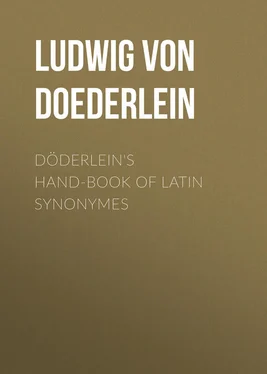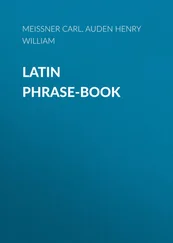Ludwig Doederlein - Döderlein's Hand-book of Latin Synonymes
Здесь есть возможность читать онлайн «Ludwig Doederlein - Döderlein's Hand-book of Latin Synonymes» — ознакомительный отрывок электронной книги совершенно бесплатно, а после прочтения отрывка купить полную версию. В некоторых случаях можно слушать аудио, скачать через торрент в формате fb2 и присутствует краткое содержание. Издательство: Иностранный паблик, Жанр: Языкознание, foreign_antique, foreign_prose, на английском языке. Описание произведения, (предисловие) а так же отзывы посетителей доступны на портале библиотеки ЛибКат.
- Название:Döderlein's Hand-book of Latin Synonymes
- Автор:
- Издательство:Иностранный паблик
- Жанр:
- Год:неизвестен
- ISBN:нет данных
- Рейтинг книги:3 / 5. Голосов: 1
-
Избранное:Добавить в избранное
- Отзывы:
-
Ваша оценка:
- 60
- 1
- 2
- 3
- 4
- 5
Döderlein's Hand-book of Latin Synonymes: краткое содержание, описание и аннотация
Предлагаем к чтению аннотацию, описание, краткое содержание или предисловие (зависит от того, что написал сам автор книги «Döderlein's Hand-book of Latin Synonymes»). Если вы не нашли необходимую информацию о книге — напишите в комментариях, мы постараемся отыскать её.
Döderlein's Hand-book of Latin Synonymes — читать онлайн ознакомительный отрывок
Ниже представлен текст книги, разбитый по страницам. Система сохранения места последней прочитанной страницы, позволяет с удобством читать онлайн бесплатно книгу «Döderlein's Hand-book of Latin Synonymes», без необходимости каждый раз заново искать на чём Вы остановились. Поставьте закладку, и сможете в любой момент перейти на страницу, на которой закончили чтение.
Интервал:
Закладка:
Arcere; Prohibere. Arcere (ἀρκεῖν, from ἐρύκειν) means to keep off and bar the entry, in opp. to admittere , Plin. H. N. xii. 1; on the other hand, prohibere means to keep at a distance, and prevent the approach, in opp. to adhibere . The arcens makes defensive opposition, like the resistens , and protects the threatened; but the prohibens acts on the offensive, like the propulsans , and retaliates hostility on the assailant. (iv. 430.)
Arcessere; Accire; Evocare; Accersere. 1. Arcessere and accersere denote, in the most general sense, merely, to send for; accire supposes a co-ordinate relation in those that are sent for, as, to invite; evocare, a subordinate relation, as, to summon. The arcessens asks, the acciens entreats, the evocans commands, a person to make his appearance. Cic. Att. v. 1. Tu invita mulieres, ego accivero pueros: compare with Dejot. 5. Venit vel rogatus ut amicus, vel arcessitus ut socius, vel evocatus ut qui senatui parere didicisset. Or, Liv. x. 19. Collegæ auxilium, quod acciendum ultro fuerit, with xliv. 31. Evocati literis imperatoris. And xxix. 11. Æbutia accita ad Sulpiciam venit; and 12. Ut Hispalam libertinam arcesseret ad sese. 2. Arcessere (from cedere) means, originally, to order to approach; on the other hand, accersere (from σκαίρω), to come quickly, or, to make haste; but both words have been confounded with each other, from similarity of sound. (iii. 283.)
Arctus, see Angustus .
Ardere; Flagrare. Ardere (from ἐρεύθειν) means to be in a visible glowing heat, like αἴθειν; on the other hand, flagrare, to be in bright flames, like φλέγεσθαι. Hence, metaphorically, ardere is applied to a secret passion; flagrare, to a passion that bursts forth. Cic. Or. iii. 2, 8. Non vidit Crassus flagrantem bello Italiam, non ardentem invidia senatum. (iv. 21.)
Arduus; Difficilis. Arduus (from ὀρθός) means difficult to ascend, in opp. to pronus ; on the other hand, difficilis means difficult to execute, in opp. to facilis . Arduus involves a stronger notion of difficulty, and denotes the difficult when it borders on the impossible. Plin. Ep. iv. 17. Est enim res difficilis ardua . Tac. Hist. ii. 76. Æstimare debent, an quod inchoatur, reipublicæ utile, ipsis gloriosum, aut promptum effectu, aut certe non arduum sit. Cic. Verr. i. 51. Cum sibi omnes ad illum allegationes difficiles , omnes aditos arduos , ac pæne interclusos, viderent. (ii. 105.)
Arduus, see Altus .
Arena, see Sabulo .
Arguere; Incusare; Culpare; Criminari; Insimulare; Deferre; Accusare. Arguere (from ἀργός) is the most general expression for any imputation of supposed or actual guilt, whether in a court of justice or not, as to tax or charge with; incusare, and the less frequent term culpare, denote only a complaint made out of a court of justice; criminari, an accusation with hostile or evil intention, in a calumnious spirit; insimulare, in an undeserved or slanderous manner, through suspicion; deferre, to impeach before a judge; accusare, to impeach in a criminal court. Cic. Lig. 4, 10. Arguis fatentem. Non est satis. Accusas eum. (ii. 163.)
Aridus; Torridus; Siccus. Aridus and torridus denote an internal want of moisture; but things that are arida (from areo) have lost their moisture from a heat acting within, like αὖος, in opp. to humidus . Plin. Pan. 30, 4; on the other hand, torrida (from τέρσω), from a heat penetrating from without, in opp. to uvidus , like σκληρός; – siccus denotes dryness that is only external, confined to the surface, in opp. to madidus , like ξηρός. Plin. H. N. xii. 12. Ne sint fragilia et arida potius quam sicca folia. And xv. 29. Cato docuit vinum fieri ex nigra myrta siccata usque in ariditatem in umbra. Colum. vii. 4. (vi. 244.)
Arista, see Culmus .
Armentum, see Pecus .
Armus; Humerus; Ala; Axilla. Armus (ramus?) is the highest part of the upper arm in men; the fore-leg in beasts; the shoulder-blade, as part of the whole body, distinguished from scapula , as part of the skeleton, like ὦμος; humerus, the flat surface, which in the human body is over the upper arm, the shoulder, like ἐπωμίς; ala and axilla, the cavity which is under the upper arm, the arm-pit, like μασχάλη. Ovid, Met. xii. 396. Ex humeris medios coma dependebat in armos . And x. 599. xiv. 304. Plin. H. N. xi. 43. (iv. 27.)
Arrogantia, see Superbia .
Artes, see Literæ .
Artifex, see Faber .
Artus, see Membrum .
Arundo, see Culmus .
Arvum, see Villa .
Ascia; Securis. Ascia is the carpenter’s axe, to split wood; securis, the butcher’s cleaver, to cut meat.
Asper, see Horridus .
Aspernari, see Spernere .
Assentiri; Assentari; Blandiri; Adulari. 1. Assentiri means to assent from conviction, in opp. to dissentire ; but assentari, to express assent, whether from conviction or from hypocrisy, in opp. to adversari . Vell. P. ii. 48. Cic. Rosc. Am. 16, 99. Plaut. Most. i. 3, 100. Amph. ii. 2, 70. 2. Assentari denotes the flattery which shuns contradicting a person, like θωπεύειν; blandiri (μέλδειν), that which says what is agreeable to another, like ἀρεσκεύειν; adulari (from δοῦλος), that which would please at the expense of self-degradation, like κολακεύειν. The assentans , as a flatterer, would, by surrendering his right to an independent opinion; the blandiens , by complaisance and visible signs of affection; the adulans , by self-degradation, and signs of an unworthy subserviency, gain the favor of another. Assentatio, or the art of the assenter, has its origin in cowardice or weakness; blanditiæ, or fair-speaking, in the endeavor to be amiable, and, at worst, in self-interest; adulatio, or flattery, and servility, κολακεία, in a degrading, slavish, spaniel-like spirit. Sen. Ir. iii. 8. Magis adhuc proderunt submissi et humani et dulces, non tamen usque in adulationem ; nam iracundos nimia assentatio offendit. Erit certe amicus.. cui non magis tutum erat blandiri quam maledicere. And ii. 28. Sæpe adulatio , dum blanditur , offendit. (ii. 174.)
Asseverare, see Dicere .
Asses, see Axes .
Assiduitas, see Opera .
Assequi, see Invenire .
“Astrum” printed before “Assequi”.
Astrum, see Sidus .
Astutus; Callidus; Vafer; Versutus. Astutus or in old Latin astus (from ἀκή, acuere), and callidus, denote cunning, more in an intellectual sense, as a mark of cleverness; astutus, indeed, acuteness in the invention and execution of a secret project, synonymous with solers ; but callidus (from κάλλος), sharp-sightedness in judging of a complicated question of conduct, or worldly wisdom, as the consequence of a knowledge of mankind, and of intercourse with the world, synonymous with rerum peritus , as judicious, and, in its degenerate signification, crafty, like κερδαλέος; on the other hand, vafer and versutus denote cunning in a moral sense, as a mark of dishonesty, and, indeed, vafer (ὑφή), adroitness in introducing tricks, particularly in judicial affairs, as the tricks of a lawyer, like πανοῦργος; versutus (ἀρτυτός), versatility in dissimulation, and in the art of getting out of a scrape by some means or other; in opp. to simplex , Cic. Fin. iv. 25, like στροφαῖος. Plin. Ep. vii. 6. Juvenis ingeniosus, sed parum callidus . Cic. Brut. 48. Callidus , et in capiendo adversario versutus . (iii. 220.)
Читать дальшеИнтервал:
Закладка:
Похожие книги на «Döderlein's Hand-book of Latin Synonymes»
Представляем Вашему вниманию похожие книги на «Döderlein's Hand-book of Latin Synonymes» списком для выбора. Мы отобрали схожую по названию и смыслу литературу в надежде предоставить читателям больше вариантов отыскать новые, интересные, ещё непрочитанные произведения.
Обсуждение, отзывы о книге «Döderlein's Hand-book of Latin Synonymes» и просто собственные мнения читателей. Оставьте ваши комментарии, напишите, что Вы думаете о произведении, его смысле или главных героях. Укажите что конкретно понравилось, а что нет, и почему Вы так считаете.












